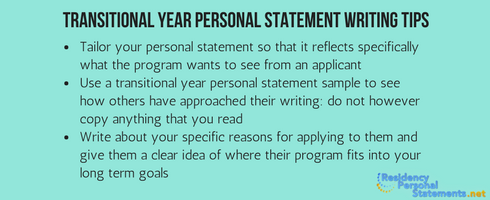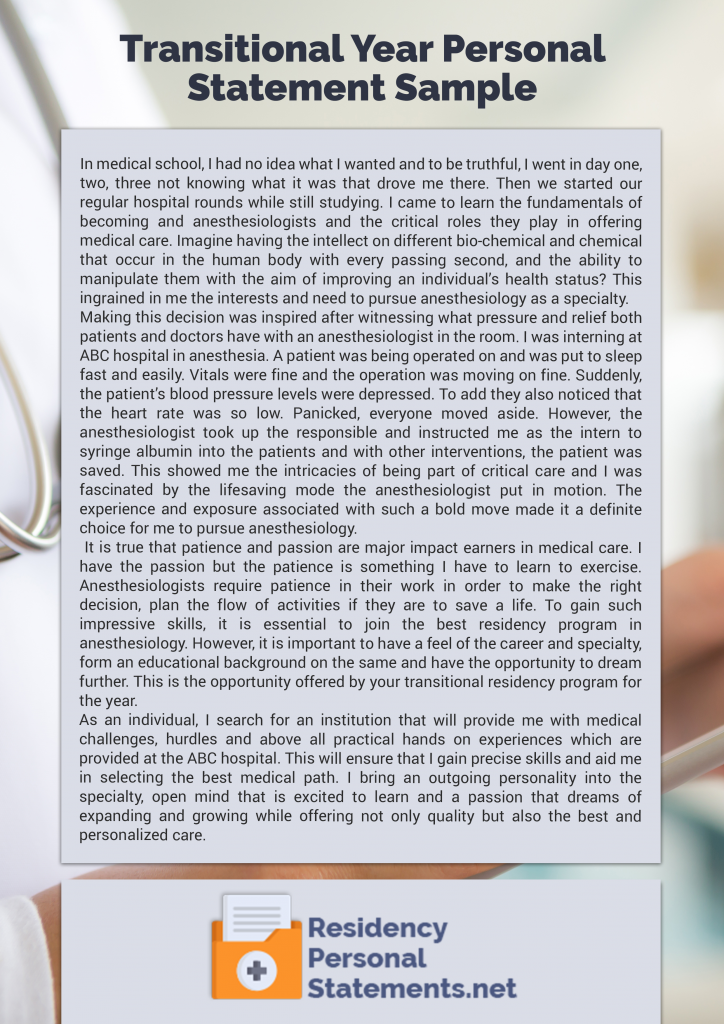
What Is Transitional Year Residency?
A well-crafted transitional year personal statement example serves as an essential guide for applicants to structure their own statements effectively. A compelling transitional statement should highlight adaptability, clinical skills, and a strong commitment to professional growth. Ensuring that your statement reflects your long-term aspirations and aligns with the specific program requirements will significantly enhance your chances of securing a residency spot.
How Important Is Your Personal Statement for Transitional Residency Programs?
Many residencies will require you to take a transitional year program before you begin your specialized training. While in some instances this is part of the program you are applying for, in others, you will require a separate application. The need to complete a transitional year makes programs highly sought-after, and thus, the competition gets tougher.
A transitional year residency offers a broad and flexible introduction to various medical fields, making it an excellent choice for students undecided about their specialty. Your transitional year personal statement will often be the most significant part of your application. You almost certainly have excellent qualifications, but they will be similar in many ways to the qualifications of those you will compete with for a place. A personal statement transitional year residency is, therefore, often your only way of showing why they should select you rather than anyone else. How to write brilliant medical residency personal statements? Writing an effective residency application personal statement is never an easy task, no matter where you are applying. It must be done with great care in a way that is going to get you noticed. Our services have helped students with their applications for years, and we can provide you with professional advice and support to make your personal statement for a transitional year a success.
What Is the Difference between Transitional, Preliminary, and Categorical Residencies?
When comparing transitional year vs preliminary year, consider that the transitional year provides a wider range of experiences, while a preliminary year focuses on a specific discipline. Many international medicine programs will require you to perform a residency internship so that you can learn the ropes in several different areas before you get focused firmly on your specialty. For some programs, this will mean applying for a separate program for that internship. If you’re wondering what is a preliminary year residency, it is a type of internship that typically focuses on either internal medicine or surgery, preparing residents for specialized training. Different types of programs for the residency that you can apply for are:
Categorical residencies
These residency programs include a yearlong internship to gain the required skills and experience. You will apply for one residency and stay there throughout your training. Applying for a categorical year match is often the preferred route for many applicants, but not every program offers this for every specialty.
Transitional residencies
Understanding what does transitional year mean in residency will help you identify if this option aligns with your career goals. These offer a full year of training across many rotations so that you can acquire the required skills for your final specialism. These programs are also useful for those students who are still unsure of what they wish to pursue or who have failed to get directly into the specialist residency.
Preliminary residencies
These are similar to transitional residencies but will further split the training into either surgery or internal medicine preliminary years.
Tips for Students Applying to Transitional Year Residency
When applying for a transitional year residency, it’s important to focus on showcasing your flexibility and broad interest in various medical fields. Your personal statement for transitional year should reflect your ability to adapt to different specialties and environments. Highlight how this diverse experience will help you build a strong foundation for your future medical career.
Additionally, emphasize any relevant experiences that demonstrate your versatility and commitment to learning across multiple disciplines.Lastly, crafting a strong personal statement for transitional year is essential, as a compelling transitional year residency personal statement can highlight your adaptability and readiness for diverse clinical exposure.
What Programs Require a Transitional Year?
Not every specialty requires a transitional year, so it is imperative that you know which will if you are not applying directly for a categorical residency. The following will usually require you to complete either a preliminary or transitional year as an intern prior to your specialism:
- Anesthesiology
- Radiation oncology
- Dermatology
- Radiology
- Diagnostic radiology
- Physical medicine & rehabilitation
- Ophthalmology
During your transitional year, you will typically have to cover all of the following:
- 4 months of inpatient medicine
- 1 month in an intensive care unit
- 1 month of emergency medicine
- 1 month of outpatient medicine
- 4-5 months of electives
Get some advice on how to avoid mistakes in your medical resident resume writing!
Where Can You Apply for Your Transitional Year?
If you are applying for a transitional year, you will need to find the right one for you. The following are a selection of programs that you may consider:
- Colorado Health Foundation Presbyterian/St. Luke’s Medical Center Program: This program is founded to offer year-long training across a wide range of different areas of clinical medicine to prepare students for their specialty.
- Memorial Sloan Kettering Cancer Center Program: This hospital provides transitional year training in 12 departments for just 24 residents every year.
- Scripps Mercy Hospital Program San Diego: This transitional year residency is very proud of the fact that many of those who participate in it then get placed in highly competitive residencies.
- Presence Resurrection Medical Center Program: This program is based in Chicago. With a very busy emergency department and excellent open-heart surgery training, this is a great place to complete your year.

How to Write Your Transitional Year Personal Statement Effectively
Crafting an effective statement that will get you noticed is a challenging task. The following tips, however, will support you in ensuring that you get yours written in a way that will give you the highest chance of success. Here are tips for a residency interview.
Always:
- Tailor your personal statement so that it can reflect specifically what the program wants to read in it.
- Use a transitional year personal statement sample to see how others have approached their writing: do not, however, copy anything that you have read.
- Write about your reasons for applying to them and give them a clear idea of where their program fits into your long-term goals.
- Do your homework and mention specific things about their program to show that your interest is serious.
- Write about yourself!
Never:
- Write about experiences that are irrelevant or too far in the past.
- Use clichés within your writing: always try to be original.
- Complain or talk negatively.
- Incorporate language that will be difficult to understand.
- Lie or plagiarize within your statement.
- Fail to proofread your statement.
We Can Help You with Your Application for Transitional Residency Programs
Whether you are writing a future long-term plan essay for the medical school or a transitional residency personal statement, our services can help you. We provide expert support through fully qualified staff that know precisely what the admissions committee will be looking for. All of our writing support will always result in a piece of writing perfectly tailored to your needs.
We always provide our help on time, and every document is delivered with a free plagiarism report. With a full satisfaction or money-back guarantee, there is no reason not to use our service.
Contact our highly skilled writers here today to ensure that your transitional year personal statement will get you noticed.

What to Learn From the Best Personal Statement Residency Examples
No Ideas for Writing? Personal Statements Residency Sample Can Help! Personal statement is one of the mandatory requirements for residency application. It’s a short essay where students tell the admissions office about themselves and why they should be allowed to take the program. This is one of the ways an applicant can set themselves apart […]
Read More
Medical School Letter of Recommendation: The Key to Your Success
How Many Letters of Recommendation for Medical School and Why Getting into the desired university, earning a medical degree, and then into the chosen clinic is a long and competitive road. Prospective students must demonstrate exceptional academic achievement, strong personal qualities, and a genuine passion. While your grades, test scores, and personal statement play an […]
Read More


